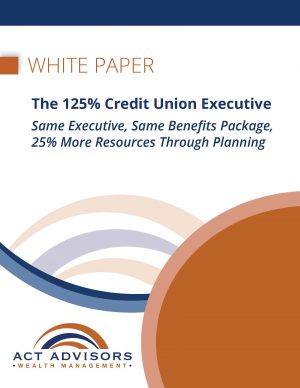ACT Advisors is proud to release our white paper, The 125% Credit Union Executive, where we explain how financial planning is one of the least expensive benefits a credit union can provide its executives while significantly improving their financial outcomes — by as much as 25%. Executive benefits present many complexities that require personal financial planning and without a strategy that optimizes their CASD, 457(b), and 401(k), executives may not realize the full impact of their benefits suite.
The report’s actionable insights are based upon a detailed case study of a credit union executive’s investment and retirement planning strategy focusing on three concepts: income timing, risk allocation, and income tax planning.
When credit unions offer financial planning to their executives, they help them realize the full potential of their benefits and replace obscurity with tangibility. It can also be a point of difference when recruiting and retaining top talent in the current labor market. With the ability to view their comprehensive financial picture and understand income distribution and consumption timings, executives can feel more confident successfully driving their teams, membership, and the credit union movement forward, without worrying about their personal finances.

The COVID-19 pandemic and subsequent Great Resignation have put significant pressure on employers to reevaluate their recruiting and retention efforts to seamlessly maintain operations and welcome a new generation of team members. While companies are primarily seeing this shift among their front-line positions, there has been a recent spike in credit union CEOs also pursuing retirement. As a result, credit unions have had to pivot their traditional approaches to bring in successors and replace leadership. When considering attracting and retaining top executive talent, credit unions are turning to their executive compensation and benefits package to be their competitive advantage.
As experts in credit union retirement benefits, we have seen many different types of executive benefit plans and we know how tools such as 457(b), 457(f), and collateral assignment split-dollar (CASD) plans can help executives retire comfortably. These benefits have made it possible for executives to save enough for retirement outside of IRS restrictions on traditional 401(k)s while giving credit unions leverage to keep executives in their roles for as long as possible. These are all powerful tools, but we have found personal financial planning is a missing, essential piece many credit unions overlook. Currently, only a quarter of credit unions have that offering.
In our recently published white paper, “The 125% Credit Union Executive,” we explain how financial planning is one of the least expensive benefits a credit union can provide its executives while significantly improving their financial outcomes—by as much as 25%.
Executive benefits present many complexities that require personal, strategic financial planning. Without a strategy that optimizes income timing, risk allocation, and tax planning opportunities, executives do not realize the full impact of their benefits suite. We discuss how common-held, traditional ideas individuals may have about financial planning could miss critical elements unique to executive compensation packages.
The report demonstrates the difference between self-managed and professional financial planning using a case study comparing two retirement scenarios. For example, it explains why minimizing risk in a 401(k), even as one approaches retirement, may not be the only necessary option for an executive with a 457(b) or CASD. Another example illustrates how taxable income early in retirement could negatively affect a retiree’s ability to secure low-cost, private healthcare.
The simple and affordable yet effective addition to an executive compensation plan has many benefits that could help determine an organization’s trajectory and success. Aside from maximizing the impact of credit union benefits, financial planning also has the equally important effect of providing education and peace of mind to keep executives more focused on leading their credit union rather than addressing their financial future.
Learn more about how financial planning can improve your executive suite of benefits within our white paper. Download now!


